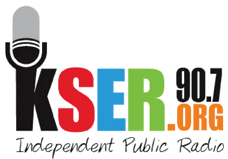History
Our roots are in the community
Nearly 20 years ago, a group of local citizens succeeded in bringing non-commercial, public radio to Snohomish County. The concept of listener-supported radio was still relatively unusual. There were no public radio stations in the North Puget Sound.
From the beginning, KSER was to be rooted in the community. For most of our history we had only one paid staff member. Most of the voices heard on the station belonged to volunteers -- local voices reflecting community news and happenings. Financial planning and management did not exist. There were many months when paying the rent was a challenge.
As we near our third decade of life, KSER has gained organizational and fiscal maturity. Important alliances have been developed with other cultural institutions and non-profits. With 13,000 weekly listeners and nearly 1,000 members, KSER now has a $350,000 annual budget and 3 employees.
KSER now broadcasts premier national and international public radio news programming, like the BBC News Hour, Democracy Now, and The Takeaway from PRI. Our local news and public affairs programming runs the gamut from County election coverage to environmental, labor, human rights, and social justice issues in the Sno-Isles. Our music programs cover the breadth and depth of musical creativity, from Bluegrass to blues, local to World music.
And KSER is the only broadcast station – commercial or public, TV or radio – dedicated to covering the vital community issues unique to Snohomish County and the North Puget Sound. KSER is truly one of the area's most important cultural resources.
Beginnings
KSER began regular broadcasting on February 9th, 1991 at 1000 watts with the studio and transmitter located in Lynnwood, Washington. KSER came on the air licensed to the non-profit Jack Straw Foundation based in Seattle. The station claimed, at 90.7 FM, the last non-commercial broadcast frequency available in the Central Puget Sound region.
The Jack Straw Foundation has a long history with community radio, having started KRAB in Seattle nearly 40 years ago. KRAB, established in 1963 by Public Radio Pioneer Lorenzo Milam (see the book Sex and Broadcasting by Lorenzo Milam), was the second non-commercial, community-supported radio station on the air in the United States. It operated in the commercial band at 107.7 FM for nearly 20 years, broadcasting from such diverse 'homes' as an old donut shop and an old firehouse on Capital Hill. KRAB went off the air in the early 1980's and its frequency was sold to a company interested in operating a commercial radio station. Eventually, the money from the sale of KRAB was used to establish and operate both the non-profit Jack Straw Production facility in Seattle, and KSER-FM.
KSER was operated by the Jack Straw Foundation until 1994. In 1994, the Jack Straw Foundation decided to divest itself of KSER. The Jack Straw Foundation invited a group of listeners to take over the radio station operations. In late 1994, this group created the non-profit KSER Foundation to operate the station. The Foundation accepted the property and assets of KSER from the Jack Straw Foundation. The Federal Communications Commission gave final approval for the transfer of the broadcast license in early 1995.
When the station signed on in 1991 it was understood that its power of 1000 watts was not sufficient to adequately serve the people of Snohomish County. In fact, the location of the transmitter, coupled with the terrain and the low power effectively kept the signal from being heard in Everett, the station's city of license. A translator at the frequency of 90.5 FM was briefly used to serve Everett.
Move to Snohomish County
In late 1996 efforts began to secure funding for and permission to move the transmitter to a location north east of Everett and to raise the power. In mid-1997 authorization from the Federal Communications Commission was secured to raise KSER's power to 5800 watts and move the transmitter to a site near Lake Stevens on Soper Hill. This change allowed KSER to be heard clearly for the first time in Everett and regions north.
On April 19, 1998, KSER began broadcasting from its new location, at its new power and started a new chapter in its history. Funding for the new transmitter and relocation was made possible by a federal Public Telecommunications Facilities Program grant, and generous support of the Seiko Corporation and Motorola Antenna Site Services Company.
How It All Works
Operation of KSER is made possible by the dedication and efforts of over 100 volunteers who provide the programming, do the filing and bookkeeping, handle the cleaning, and perform all the other support needed to keep a radio station on the air. KSER's volunteers contribute over 25,000 hours annually to make their communities a better place to live and work.
KSER's programming is unique. Our focus is on serving Everett and the other communities of Snohomish, and North Puget Sound counties. Our news, public affairs programming and public service announcements emphasize the North Puget Sound region. Our use of volunteers to create the programming, results in a radio station that is both fascinating and challenging for a casual listener. KSER's music emphasizes world and traditional sounds that are unique for this area. We are different and adventurous, by design.
Community Support
KSER is an independent community radio station, the license and assets held by the KSER Foundation. As a non-commercial radio station, KSER relies on its listeners and the communities it serves for support.
 As a community licensee, KSER has no major "institutional" backer. Nearly 50% of our budget comes from listener support. Other sources include rental income from our tower. A smaller proportion of our income is derived from underwriting, special events (such as concerts and our annual dinner), and grants. In 2009, we will receive NO MONEY from the Federal Government.
As a community licensee, KSER has no major "institutional" backer. Nearly 50% of our budget comes from listener support. Other sources include rental income from our tower. A smaller proportion of our income is derived from underwriting, special events (such as concerts and our annual dinner), and grants. In 2009, we will receive NO MONEY from the Federal Government.
In these challenging times, you rely on KSER more than ever for the non-commercial, independent news and information, and the inspiring music you love.
The current economy presents challenges to KSER, too. As support from foundations and the business community has shrunk due to the economic downturn, we rely more than ever on your individual contribution.
Please make a donation to support the service you value, and further the work we do to benefit the whole community.
- 121648 reads

 View RSS feeds
View RSS feeds








